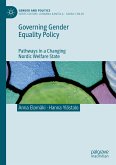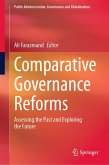This book assesses how governance has evolved in six nations - England, Australia, Canada, Germany, Italy, and the Netherlands - between 1970 and 2018. More specifically, it examines how the governance approaches and the sets of policy tools used to govern have altered with respect to four public policy sectors that represent core responsibilities of the modern OECD state: education, energy, environment and health. To structure this analytical approach, the book harnesses sociological institutionalism in the area of 'policy sequencing' to trace both the motivations and the consequences of policy-makers' altering governance approaches and the resulting policy tools. Combining a comparative and international focus, this book will appeal to scholars and students of public policy and governance.
Giliberto Capano is Professor of Political Science and Public Policy at the University of Bologna, Italy.
Hinweis: Dieser Artikel kann nur an eine deutsche Lieferadresse ausgeliefert werden.
Anthony R. Zito is Professor of European Public Policy at Newcastle University, UK.
Federico Toth is Professor of Political Science at the University of Bologna, Italy.
Jeremy Rayner is Professor at the Johnson Shoyama Graduate School of Public Policy, University of Saskatchewan, Canada.
Dieser Download kann aus rechtlichen Gründen nur mit Rechnungsadresse in A, B, BG, CY, CZ, D, DK, EW, E, FIN, F, GR, HR, H, IRL, I, LT, L, LR, M, NL, PL, P, R, S, SLO, SK ausgeliefert werden.
Hinweis: Dieser Artikel kann nur an eine deutsche Lieferadresse ausgeliefert werden.
Es gelten unsere Allgemeinen Geschäftsbedingungen: www.buecher.de/agb
Impressum
www.buecher.de ist ein Internetauftritt der buecher.de internetstores GmbH
Geschäftsführung: Monica Sawhney | Roland Kölbl | Günter Hilger
Sitz der Gesellschaft: Batheyer Straße 115 - 117, 58099 Hagen
Postanschrift: Bürgermeister-Wegele-Str. 12, 86167 Augsburg
Amtsgericht Hagen HRB 13257
Steuernummer: 321/5800/1497
USt-IdNr: DE450055826
Bitte wählen Sie Ihr Anliegen aus.
Rechnungen
Retourenschein anfordern
Bestellstatus
Storno









